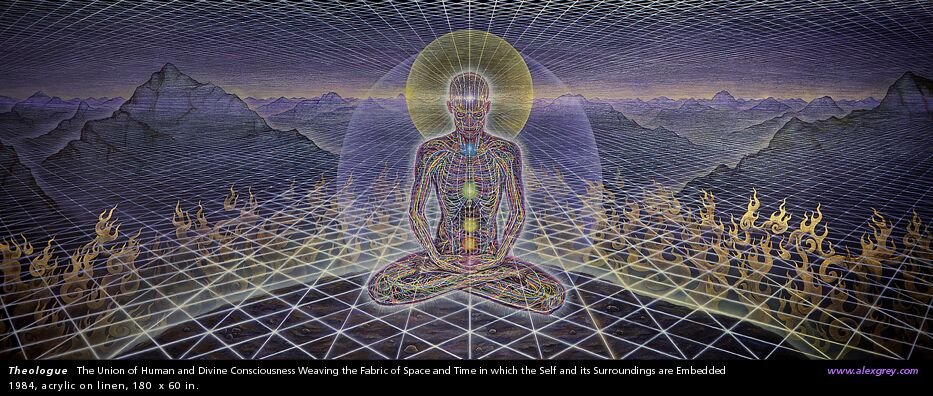Friday, July 17, 2009
Monday, June 22, 2009
Day 10
The action in Tehran is beginning to look (and sound) like civil war.
Composed by
Scott
at
12:51 AM
0
Dendrites
![]()
Tuesday, June 9, 2009
Insomnia Babbling, Vol. 726
Eyes puffy, movements sluggish, brain fuzzy. Can't remember my last full night of sleep. Caffeine is a poor substitute for sleep. Cubicle grey death. Digits in, digits out. Pixels, logic, bank account. Sipping espresso, listening to the executive schmooze the managers. Predatory laughter. Eyes glaze.
American corporations have perfected the model of a totalitarian state, but have not the will to use it. By now, other nations have dared. Singapore comes to mind. Here in the "good ol' U S of A," we still value what relative freedom we have, though we loathe the responsibility it brings.
I heard a teenager on NPR the other day, talking about how young people these days interact with technology. (Paraphrasing) "We don't understand privacy. We're monitored closely by our parents, by our teachers, our every movement is tracked electronically. So we don't bother trying to hide anything. We broadcast our movements, our thoughts, our feelings, several times daily, on MySpace, on Facebook, on Flickr, by group-text and video on cellphones. We live publicly." Now parents are paparazzi.
I'm horrified by the thought. When I was a kid, hiding was my favorite activity. My greatest joy was in knowing that at that moment, not a soul in the world could track me down. I had hiding spots everywhere. I had a passive-aggressive deal with my parents; the more they fucked up and pissed me off, the longer I disappeared. My bicycle was a magical teleportation device, freedom incarnate, the only object my parents could threaten to take away. I'd bum a quarter off a stranger in the 7-11 parking lot in El Cajon, call them from a pay phone (remember those?) and bargain. At first, they'd be mad (come home this instant, young man) but soon they'd realize they were not in control, that I had the will, the courage, to run away. Eventually they'd haggle, and we'd work out a deal. I would come home, as long as I wasn't in trouble.
I'm only 31 and already, I'm separated generationally from Kids These Days. These social changes, they speed up from generation to generation. I've often said that while technology changes quickly, social movement changes slowly. I now get the feeling that this is changing, that social movement, though still lagging far behind Moore's Law, is catching up. Perhaps someday I'll propose my own law, in some obscure computational neurosociology journal that doesn't exist yet, and never will be on paper.
William Gibson, whose futurism cred was solid from 1982, when he coined the term "cyberspace", to 1999 when he announced he could no longer writer scince fiction (the future is unknowable because the present is incomprehensible), believes that all social change is technologically driven. If that is so, then this gnawing anomie, this hyper-accelerated ennui, this rootless social millieu in which we tenuously reside, this whirlpool of change, will become a blender. Maybe it already is.
All social institutions are quickly losing credibility. The government is a sold-out auction house, regardless of the tenants. The citizens never tire of trying to vote themselves money from the treasury, while ignoring crimes of the highest order. The fourth estate has been discredited, with most newspapers going bankrupt, and cable news reduced to incoherent babbling by lunatics. Democracy's sheen has worn off; every democratic election everywhere in the world is immediately followed by cries of foul by the losers, the vote machines now computerized, their source code a patented trade secret making a profit for corporations whose boards contain almost as many conflicts of interest as the government weapons contractors. The banking system has been exposed as a massive shell game with a back-door into the public's pocket; a baffling, poorly-designed global scam, Ponzi writ large with magic wands and slick PR propaganda. The stock markets are certainly a blender, whose movements can no longer be understood, even by the technorati who run them, the quants and algos of the early 21st century. Public schools pathetic babysitting prisons, private schools indoctrination centers for the investment class.
And yet, people still make love, still have babies (though not through the vagina as often as in most of human history). People still write songs, though few of them feel authentic anymore. Having grown up in the age of CD's and Ipod's and mp3's, we've heard millions of songs by now, and they all start to sound the same after a while. The last musicians who never heard recorded sound performed before my grandmother was born. All music is now derivative, unless you want to get way out and make industrial feedback weirdness with no time signature and no melody. People still write poetry, but few still read it. I can't quite wrap my head around the impact of waning vocabulary amidst growing visual literacy.
People still get old, but as they do, they become more cybernetic. Hearing aides, contact lenses, pacemakers, tooth-fillings, knee replacements. Their bloodstream pumps with artificial additives- drugs for cholesterol, for diabetes, for headaches, for weight-loss, for rock-hard 80-year-old erections. Old people these days are a work of art, crafted in factories by scientists working in shifts.
Trees still grow. Birds still sing. Rain still falls. And sometimes, two people connect. Deeply. Intimately. Two pairs of eyes, reflecting each other in comfortable stillness. Emotional presence. Maybe things don't change that much after all. Maybe that spark, that connection, that presence, remains. Maybe the relentless onslaught of technology, the bewildering social madness we internalize, maybe it can't change love. Maybe love is an unassailable abstraction. Maybe no matter how much people change, love never does. It keeps us sane. Keeps us human. Keeps us coming back for more.
Composed by
Scott
at
4:01 PM
0
Dendrites
![]()
Monday, May 11, 2009
First Bank of Scott
The recent financial catastrophe, in which America's five largest investment banks have disappeared, the world's largest insurance corporation and largest mortgage holders taken over by the government, and the unemployment rate nearly doubled, has gotten me thinking. Although I'm a polymath, I typically shy away from economics. I've never given much thought as to why. I've come to realize that the language of economics sets off my bullshit detector. It's a deceptive, manipulative language, a contrived complexity. But lately, being curious why and how 13 trillion dollars of American money has disappeared has forced me to try and learn this language of bullshit.
Starting with questions like "where does money come from?" One might assume it is created by the U.S Treasury. Not so. The treasury's money comes from the taxpayer. So where does the taxpayer get it from? A glance at a green bill in one's pocket yields the phrase "Federal Reserve Note," leading one to believe that our money is created by the Federal Reserve, the central banking system created by an act of Congress. Not quite so. After some digging, I'm fairly certain (again, the language of bullshit is thick in this arena, so I'm straining here) that the Federal Reserve monitors and controls how money is created. However, the Federal Reserve is merely a collection of private banks, run by a board appointed by the U.S. President. The money, however, is actually created by the private banks themselves, in the form of credit. Out of thin air. Poof. The Federal Reserve regulates how this is done, but remember, the Federal Reserve is a fancy name for a consortium of private banks. Making this consortium a Federal Reserve gives the banking industry a back-door into the U.S. Treasury.
If you read an economics textbook, it will tell you that a customer stores his money in a bank, and the bank then lends that money to someone else plus interest, then keeps the profit. Under this paradigm, the bank always has enough money in circulation to cover its deposits. Ah, how sweet a fable that is. It hasn't worked that way for quite a while.
Banks use what's called fractional reserve banking. That means that a bank isn't actually expected to have all the money. They're usually expected to have a dollar for every three or four that they lend. This 3-to-1 or 4-to-1 ratio is called leverage. I've always considered this dangerous, but it worked pretty well for a long time. However, decades of erosion in the laws that regulate capital, many of which were constructed in the wake of the Great Depression (an era we'd all do well to study), allowed investment banks to skirt the rules. Clever men in business suits, armed with MBA's and PhD's, cloistered in Manhattan power firms, found more and more clever ways to maximize their leverage. Some of these investment banks, such as Lehman Bros. and Merryl Lynch, were leveraged as much as 40-to-1.
Now, this isn't rocket science. If you have 40 dollars in outstanding debt for every dollar you possess, you are headed for failure. This is essentially a Ponzi scheme. As long as you keep new investments coming in, you can keep paying the previous investors. For a while. As long as the richest nation in history continues to get richer, everything is fine.
But everything is not fine. Everything is fucked. National governments around the world are teetering on collapse because of this. Millions of people are hungry because of this. The world's economy has ground to a halt, and you can almost hear six and a half billion people holding their breath.
But I know that the system will not clean its own corruption. The American system is terminal. Much of the profit in this system has has been invested in the political process. The investment banks were top donors to both major candidates in the 2008 presidential race. Most secretaries of the treasury and directors of the Federal Reserve are investment bankers. The bankers own this shit. They own you. They own me. We belong to them. You think you own your house? A bank owns it. You think you own your car? A bank owns it. How does your employer pay you? In a check issued by a bank. They own this shit.
A banker in an office in mid-town Manhattan creates money in a database. POOF! He transfers some of it to himself. POOF! Then he buys food with it. All of the people involved in making that food worked their asses off- the farmer who planted and harvested it, the trucker who hauled it to the grocery store, the clerk behind the cash register, they all worked for that money. But not the banker. The banker is a tick on the ass of the American people.
Not happy with food, the banker wants more. A mansion, a sports car, a yacht. Still not content, he begins to contrive more and more complex ways of creating money. More risk, more greed, trying to squeeze blood out of American workers as they labor to build the mansion, build the car, build the yacht, clean his house, grow his food. Eventually the schemes of the bankers crash the system. But remember, the system belongs to the banker. So the bank begs the Federal Reserve for an emergency bailout. But remember, the Federal Reserve is run by the bankers. In the interest of the banking system, the private banks that fund the Fed may bail out a fucked up investment bank. However, when the entire banking system goes belly-up, the Federal Reserve goes to the Treasury and begs the Treasury to bail out the banks. And the Treasury, which is run by a former investment banker, does so. It takes trillions of dollars of money from us, the taxpayers, and gives it to the banks.
So not only do the banks create money out of thin air, using it to get American workers to create their homes and cars and food, they get to steal tax money from those same workers. Trillions. The U.S. Government so far has given, loaned, or committed $13 trillion to the American banking system. How much is $13 trillion? I'll tell you how much. It's enough money to feed, clothe, and educate every single human being on Earth. It's enough to make a huge leap forward in the evolution of the human species. Instead, it'll be used to keep the richest humans in the history of the world rich.
If you ask a banker or economist if that's how it really works, they'll roll their eyes and pat you on the head and assure you that it's much more complicated. Then they'll refer you to complex texts involving statistical analysis. But that's bullshit. It's contrived complexity. The cold, hard, fact is that every time a bank makes a loan, it is creating money out of thin air. While coins and bills are printed by the Treasury, coins and bill represent a tiny portion of our money supply. The vast majority of money is credit. Bankers, after they've waved their magic wand and created money, spend the rest of their time obfuscating the deed by using euphemistic language and complicated arithmetic to distract us from their greed. We don't have time to penetrate the bullshit because we're too busy working to get money. From a bank. That's a scam.
I'd be furious, but I know better. I'm done wasting my emotional energy on things I cannot change. So instead, I've decided to start my own bank. Hey, if you can't beat 'em, join 'em. I want to create some money. I could use it to do good things instead of bad.
So I've downloaded an application to create a bank in the State of California. The application is one page long. All I need is a $5,000 fee. Then I must convince the state banking commissioner that I am a reputable person with a solid business model.
So here's my plan: raise $5,000 (venture capital, anyone?), glad-hand the commissioner, get a license, move my headquarters to the Cayman islands (so I don't have to pay taxes), apply for entry to the Federal Reserve System, bribe a few Fed governors, then declare bankruptcy, beg for a bailout, and retire to write my memoir "I am a Rich Asshole, and You are a Poor Schmuck". Then I'll go on a speaking tour. Of course, I'll donate the proceeds to charity.
I'll be in Switzerland by Christmas, where I'll apply for a job at the Bank for International Settlements.
Composed by
Scott
at
2:38 PM
1 Dendrites
![]()
Monday, March 2, 2009
Thursday, February 19, 2009
The Coming Decade
Read this if you want to know what's happening to the economy.
Read this if you want some ideas of how to cope in the next decade.
Don't try to read them both in one sitting. They're long and the subject matter is intense. But do read them.
Composed by
Scott
at
1:18 PM
0
Dendrites
![]()
Friday, February 13, 2009
Wounded Healers
burn through the pain
burn through the confusion
burn through the fear
burn with holy cleansing fire
and emerge reborn
conscious but not thinking
neither reflecting nor projecting
here now in this moment
open your heart and let feeling flow
the joy lives where the pain lives
two sides of the same coin
let them flow
face to face
flow with me
here and now
transcend this wretched beauty
two trees
lashed by the storm
bent and thrashed
straighten slowly in the morning sun
ready for spring
Composed by
Scott
at
5:26 PM
0
Dendrites
![]()
Wednesday, February 11, 2009
Hard Rain
Dark clouds fill the sky. February has always left me feeling unsettled. As the economy continues to collapse, I see my loved ones facing hard decisions. More and more of my friends are unemployed. The money is running out. No one is hiring. While banks refuse to lend, house prices fall and rental prices rise. A sick feeling fills the pit of my stomach. Maybe instead of buying musical equipment and taking trips, I should have saved some more money. My job is safe for now, but for how long is anyone's guess. Our CEO called an all-hands meeting for 9am tomorrow morning. I'm trying not to worry.
The reverberations from the US financial collapse have staggered the world. Iceland's economy went bankrupt and their government collapsed. Dubai is filled with empty cars, as industrial expats watch their investments tank, the realization of Sharia's punishment for debt default sinks in, they leave the keys in the ignition and fly home on their last few dollars. The Chinese government just laid off 20 Million people. The business section of today's newspaper is a massacre. These reverberations are coming home now. We're on the edge now. This year will not be kind to any of us. Times of world-changing crisis are here.
I'm sure that in the long run, things will be fine. In the short run, we have to make tough decisions. We must be patient and remember to enjoy the simple pleasures. Try to keep your sense of perspective.
Composed by
Scott
at
3:39 PM
0
Dendrites
![]()
Wednesday, January 28, 2009
Friday, January 23, 2009
Wednesday, January 21, 2009
Reflections of Obama
I used to regularly blog on politics. In the last year or two, my interest has waned, and my life has filled with other things that called for my attention. Also, spending my days reading and writing technical manuals doesn't fill me with the desire to opine after hours, for some reason.
During the first six years of the Bush Administration, I ranted and raved about their abuses, their hubris, their lies, their incompetence. Eventually, though, I just got tired of being angry. I could not possibly sum up how I feel about the savage gang of pseudo-intellectual, faux-patriotic pimps, pushers, power whores, and cronies who have run rampant over this land in the past 8 years. Whole bookshelves have been written on the subject, and perhaps, after some time has passed, I'll be able to find the words to assess the damage done and make a reckoning. But that night is not this night. This is a night for celebration.
In 2004 I was paying very close attention to the political scene, keeping an eye on the electoral race, and struggling to decide whether to vote for a walking corpse named John Kerry, or abstain altogether in disgust. On election day, I made the decision to vote for Kerry. I wanted my voice to be heard in opposition to the Bush Administration.
I regretted my decision the next day when, knowing full well the extent of voting irregularities in the last election, knowing full well the conflicts of interest created by a Republican administration that had deeply stacked the deck, Kerry rolled over and conceded defeat before the all the votes had even been counted. Later, the Comptroller General of the United States released an official report casting doubt on the validity of that election, but by that time, Bush's power was too deeply entrenched to ignore.
But something had happened during that cycle, the importance of which hadn't been immediately obvious. While purusing a news story about the 2004 Democratic National Convention, I read that the keynote speech had been given to a guy I'd never heard of. So I hopped on Youtube (which I was in the proccess of falling in love with- I'm now an official Youtube whore), and watched the speech. Out of the convention hall and into the limelight strutted a skinny young black guy named Barack Obama. I scratched my head in wonder. As he began to speak, I consulted the almighty Google and discovered that he hadn't even been elected to national office yet (although he was a few weeks later, due in some part to that speech).
I wondered "who is this guy and why is he being put up front so quickly?" But a few minutes later, as his speech began to sink in, as I watched his delivery and listened to his words, I began to get it. He moved me. Now, I am a very cynical observer of politics, and I have a pretty good bullshit detector for rhetoric, and yes, there were passages that sounded like boilerplate liberal idealism. And I've since heard old school Obama staffers laughing at that speech, which is apparently his original stump speech that he used to give to 10 people at a time in small rooms in the south side of Chicago, when he was a community organizer. But for me, that's exactly the point. Obama personally wrote every word of that speech. How many politicans can say that? Cerntainly not our last President, that meely-mouthed imbecile.
By the end of his keynote speech, I found myself nearly at the point of tears, amazed to hear a politician who sounded like he actually believed what he was saying. I could hear in his voice and see in his demeanor that he was not, like most candidates, from old money, or an established political family, had not been groomed from birth, that he had earned his way to where he was through hard work. I could feel it. And for a moment, I thought "this guy could be the first black president".
I didn't expect it to be so soon.
But here we are, scarcely four years later. These moments are generational. When, in late 2005, he asked one of his political mentors, Tom Daschle, if he thought he should run, Daschle said, "if you're ever going to do it, now's the time". He was right. We needed fresh blood. We needed a change.
Don't get me wrong. In the long run, Obama may or may not be able to change anything. I tried hard during his campaign not to fall in love with him so that he couldn't break my heart. But I couldn't pass up the chance to support what appeared to be the only political candidate in my lifetime that I could actually feel good about. I researched him as much as I could, read his critics extensively, watched all his major speeches (the 2004 DNC keynote, the Brandenburg Gate speech, the nomination acceptance speech, the speech on race, etc.), watched him debate, watched him stump. I couldn't find a single fuckup. Name any other politician and you can find a clip on Youtube of them making a major fuckup. Not Obama. Not in two long years of campaiging. The mind boggles.
He won, not only in spite of his name, race, and background, but he won decisivley, the largest popular vote in American history. He redrew the map of the American political spectrum, just like he said he would.
I promised myself when he was elected that I'd give him until at least Inauguration Day before I start kicking his ass. And yes, my friends, I will kick his ass. Because I voted for him, and because my taxes pay his salary, and because I respect my duty as a citizen in a demoratic republic to remain aware and involved, it is my duty to kick his ass.
But not today. Today, in the elevator at work, I talked to Finneus. He's the old black man that washes cars in the third sub-basement, where I park my car. We usually wave at each other, and once he helped me get into my car, when I'd locked my keys in it. Today he was grinning from ear to ear. He said he'd taken the morning off to watch the inauguration. I told him I could scarcely believe it was true. Then he said something I'll never forget. He put his hands to his face and said "I had tears streaming down my cheeks". We smiled at each other for a long moment, then I patted him on the back and walked away.
So here's to the new president, to the new American spirit. This spirit of change, the spirit of hope and renewal, may not last, it may soon be bludgeoned by the realities of war and economic collapse. But for this moment, I'm deeply grateful for Barack Obama.
Stay tuned for my next article about why Obama's national security cabinet appointments make me nervous and angry.
Composed by
Scott
at
5:11 PM
0
Dendrites
![]()
Monday, January 12, 2009
Sunday, December 14, 2008
Wednesday, December 10, 2008
Fight of Our Lives
Life has been good to me lately, but many of the people I care most about are suffering.
Ben Harper sings (screams, actually) in the song Better Way:
Reality is sharp, it cuts at me like a knife
everyone I know is in the fight of their life
but I believe in a better way
That's how I feel right now. There are hard times upon us. This world is full of evil people who live to take, live to inflict, live to feed on the goodness of the righteous. People reliving the pain inflicted on them by their fucked up parents, inflicting the same on their children, feeding the vicious cycle, propagating evil over and over, generation after generation. But those of us with a heart must band together. We have to take care of each other. I know that it's hard to shine love from your heart when the ticks and leeches of this world are sucking you dry, but I refuse to harden my heart. You can't fight hatred. You can't fight fire with fire. You can't kill evil. You can only absorb it. It's the only way to break the cycle. So I will absorb evil, absorb suffering. I will turn the other cheek, walk away, and find someone savable to nurture. You can't fight evil, but you can make love.
I wish I could save all of my love ones from their suffering, but all I can do is tell you all how much I love you. Hang in there. Keep your heads up. Don't give up hope. Have faith in love. Believe in a better way.
Here are some songs that I listen to when I need strength and comfort. These artists have found ways to articulate things that I feel deeply. Maybe they can comfort you and give you strength.
Composed by
Scott
at
12:33 PM
0
Dendrites
![]()
Monday, November 24, 2008
National Nukes
Chinese
French
Pakistani
Russian
American
British
Composed by
Scott
at
1:26 AM
0
Dendrites
![]()
Tuesday, November 11, 2008
Monk Fight
Greek and Armenian monks box in the Church of the Holy Sepulchre... I don't speak Greek or Armenian, but it sounds like they're saying "hey, fuck you buddy, I'm trying to worship the god of tolerance, love, and forgiveness, get the fuck out of my way with your incorrect ritual before I fucking knock your ass out. Yeah, that's right, turn the other cheek, motherfucker!" I never get tired of watching religious people hurt each other. It's a beautiful thing.
Composed by
Scott
at
1:16 PM
0
Dendrites
![]()
Friday, October 24, 2008
Glowing Cat

Scientists have created a glowing cat.
I can't wait to see how the good folks at icanhascheezburger.com handle this.
Composed by
Scott
at
1:33 PM
0
Dendrites
![]()
Sunday, October 19, 2008
Powell Calls It
For the next two weeks, I'll have my eye on the polls in Virginia and Missouri.
Missouri because politically, it's the bellweather state. Besides being geographically central, Missouri voted for the president in every election since 1948 (except 1960 and that was one of the closest elections in history). And Virginia because according the calculations, the GOP simply cannot win without this traditionally Republican state, in which Obama is now up in the polls by more than the margin of error.
Composed by
Scott
at
10:23 AM
0
Dendrites
![]()
Friday, October 17, 2008
Sad Guys on Trading Floors
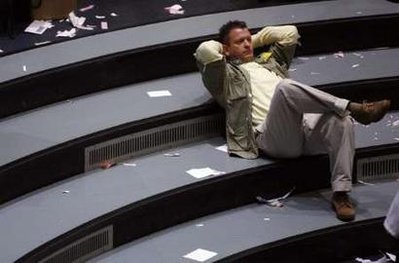
It was inevitable that someone would collect these. Snapshot of the national mood.
Composed by
Scott
at
12:01 PM
0
Dendrites
![]()
Thursday, October 16, 2008
Degrees of Paulson
Composed by
Scott
at
8:20 PM
0
Dendrites
![]()
Tuesday, October 14, 2008
Random Thoughts, vol. 223
Hello blank page. Hello, white pixels. Hello flashing cursor. Hello keyboard buttons, symbols of abstraction. Hello characters on my screen. Hello blog readers, encapsulated as you are within the relative confines of time and space.
If a million monkeys typing for a million years could write the unabridged works of Shakespeare, can a middle-class Californian stoner with a beer, a bong, and some street-smarts craft anything of value? Anything meaningful?
There is a difference between value and meaning. Value is merely the intersection of scarcity and desire. Meaning, like melody, is harder to define. My definition of melody: the part of the song you whistle. My definition of meaning: whatever gets you out of bed in the morning. But isn't that the definition of motivation? Or is meaning the content of motivation?
None of us lives long enough or knows enough people to know for sure whether or not human nature ever really changes.
Anything you analyze deeply enough falls apart. Entropy affects even consciousness. If you define a word exactly enough, zoom into a microscope or telescope far enough, deconstruct any concept completely enough, it falls apart. I like that.
We all die in the end.
We are part of an an event we call reality, or the Universe. The cells that make up my body now did not exist when I was born, but the atoms that make up those cells were born in a star that no longer exists.
Or maybe not. Perhaps we are the work of a vengeful and jealous invisible man in the sky. Who knows? Not me. I know nothing.
Words live lives of their own. Words can provoke feelings. Words possess this power. Words can make you feel warm like an oven full of cookies on a cold, dark night. Words can make you feel sick, like bile dripping from the lips of a fresh corpse. Words can comfort like the purr of a kitten, or terrify like a knife to your throat.
The mind is a place of its own, and words are a kind of currency there (here?). Ordering and identifying, translating and exchanging, quantifying and objectifying, abstracting and specifying, logic defined by intuition.
Power. Watch this: look here. And here. See? Power.
Cause and effect? You be the judge. I am not qualified. Not yet.
Composed by
Scott
at
9:54 PM
0
Dendrites
![]()
Monday, October 13, 2008
Distibution and Depression
Marriner S. Eccles, who served as Franklin D. Roosevelt's Chairman of the Federal Reserve from November 1934 to February 1948, detailed what he believed caused the Depression in his memoirs:
As mass production has to be accompanied by mass consumption, mass consumption, in turn, implies a distribution of wealth -- not of existing wealth, but of wealth as it is currently produced -- to provide men with buying power equal to the amount of goods and services offered by the nation's economic machinery. [Emphasis in original.]
Instead of achieving that kind of distribution, a giant suction pump had by 1929-30 drawn into a few hands an increasing portion of currently produced wealth. This served them as capital accumulations. But by taking purchasing power out of the hands of mass consumers, the savers denied to themselves the kind of effective demand for their products that would justify a reinvestment of their capital accumulations in new plants. In consequence, as in a poker game where the chips were concentrated in fewer and fewer hands, the other fellows could stay in the game only by borrowing. When their credit ran out, the game stopped.
That is what happened to us in the twenties. We sustained high levels of employment in that period with the aid of an exceptional expansion of debt outside of the banking system. This debt was provided by the large growth of business savings as well as savings by individuals, particularly in the upper-income groups where taxes were relatively low. Private debt outside of the banking system increased about fifty per cent. This debt, which was at high interest rates, largely took the form of mortgage debt on housing, office, and hotel structures, consumer installment debt, brokers' loans, and foreign debt. The stimulation to spend by debt-creation of this sort was short-lived and could not be counted on to sustain high levels of employment for long periods of time. Had there been a better distribution of the current income from the national product -- in other words, had there been less savings by business and the higher-income groups and more income in the lower groups -- we should have had far greater stability in our economy. Had the six billion dollars, for instance, that were loaned by corporations and wealthy individuals for stock-market speculation been distributed to the public as lower prices or higher wages and with less profits to the corporations and the well-to-do, it would have prevented or greatly moderated the economic collapse that began at the end of 1929.
The time came when there were no more poker chips to be loaned on credit. Debtors thereupon were forced to curtail their consumption in an effort to create a margin that could be applied to the reduction of outstanding debts. This naturally reduced the demand for goods of all kinds and brought on what seemed to be overproduction, but was in reality underconsumption when judged in terms of the real world instead of the money world. This, in turn, brought about a fall in prices and employment.
Unemployment further decreased the consumption of goods, which further increased unemployment, thus closing the circle in a continuing decline of prices. Earnings began to disappear, requiring economies of all kinds in the wages, salaries, and time of those employed. And thus again the vicious circle of deflation was closed until one third of the entire working population was unemployed, with our national income reduced by fifty per cent, and with the aggregate debt burden greater than ever before, not in dollars, but measured by current values and income that represented the ability to pay. Fixed charges, such as taxes, railroad and other utility rates, insurance and interest charges, clung close to the 1929 level and required such a portion of the national income to meet them that the amount left for consumption of goods was not sufficient to support the population.
This then, was my reading of what brought on the depression.
Composed by
Scott
at
11:00 PM
0
Dendrites
![]()
First Charles Krauthammer called it for Obama.
Then Christopher Hitchens called it for Obama.
Now Christopher Buckley calls it for Obama.
Here's how I'm calling it: only an October Surprise can stop Obama now.
And this is the perfect year for an October surprise. There is a strange alignment of power vacuums in the world at this moment.
Composed by
Scott
at
9:51 PM
0
Dendrites
![]()
Wednesday, October 1, 2008
Tuesday, September 30, 2008
Fall From Power
This article in the Gaurdian is clear, concise, and feels like a gut-punch.
Composed by
Scott
at
2:03 PM
0
Dendrites
![]()
Crisis of Confidence
I think this article sums it up nicely.
Composed by
Scott
at
12:27 PM
0
Dendrites
![]()
Thursday, September 25, 2008
Monday, September 22, 2008
Who Will Stop Al Franken?
Won't someone think of the children?
Composed by
Scott
at
11:05 PM
0
Dendrites
![]()
Wednesday, September 17, 2008
Tuesday, September 16, 2008
Marjoe (in 9 parts)
An interview with Marjoe Gortner, by Jim Siegelman:
Marjoe Gortner was the first Evangelical preacher to blow the whistle on his profession. In his documentary film, Marjoe, made in the late sixties, he revealed age-old tricks of the trade and exposed some of the entertainment aspects of the popular movement that have made it big business.
If he lives forever, Hugh Marjoe Ross Gortner will most likely always be "The World's Youngest Ordained Minister." Born January 14, 1944, Marjoe was almost strangled during delivery by his own umbilical cord. The obstetrician told his mother that it was a miracle the child survived, and thus "Marjoe" -- for Mary and Joseph -- the Miracle Child, took his place at the end of a long line of Evangelical ministers.
From the beginning, his preaching skills were meticulously cultivated. Before he learned to say "Mamma" or "Poppa," he was taught to sing "Hallelujah!" When he was nine months old his mother taught him the right way to shout "Glory!" into the microphone. At three, he could preach the gospel from memory, and he received drama coaching and instruction in every performing art from saxophone playing to baton twirling. On Halloween, 1948, at the age of four, Marjoe was officially ordained and thrust into a wildly successful career as the Shirley Temple of America's Bible Belt, the sprawling non-geographic community of strict adherents to the Christian scriptures. In the following decade he preached to packed tents and houses coast to coast, as enthusiastic audiences flocked to see the Miracle Child who allegedly received sermons from the Lord in his sleep. Owing to his mother's careful training, harsh discipline, and indomitable ambition, Marjoe's sermons were flawlessly memorized, right down to each perfectly timed pause and gesture. Frequent Hallelujahs and Amens punctuated his performances, which were cleverly promoted with titles such as "From Wheelchair to Pulpit" and "Heading for the Last Roundup," which Marjoe preached wearing a cowboy suit.
Marjoe's captivating sermons rarely failed to fill the church collection plate to the brim, and his renowned faith healings were miraculous even to him. In his teens, however, Marjoe grew disenchanted with the continued deception of his divine powers. He left the Evangelical movement in search of more legitimate means of employment. He spent some time in a rock band, trying to move with the changing times; then he returned to the Evangelical circuit to make his revealing motion picture. Marjoe is one of those frank films that delves deeply into sensitive areas of American morality that slip over the line into profiteering.
We found Marjoe in Hollywood last year, where he now resides on a secluded hilltop estate in Laurel Canyon. After we drove up the winding dirt road that leads to his lofty home, Marjoe greeted us cordially and ushered us into his sunken living room, where he pointed out some familiar features of the sprawling southern California landscape visible through his wall-sized picture window. We told him that we had come to hear about his miraculous powers of "saving" and "healing," trade secrets that neither his film nor his subsequent biography unraveled satisfactorily. Tall, handsome, with lion-colored curls and a penetrating stare, even in T-shirt and faded jeans Marjoe had an air of power about him. From the outset of our talk, however, he squashed all notions we might have had that his talents were in any way extraordinary.
"I don't have any power," he started off, just to set the record straight. "And neither do any of these other guys. Hundreds of people were healed at my crusades, but I know damn well it was nothing I was doing."
Yet, Marjoe admitted, he remained somewhat baffled by the thousands of souls he helped to "save" and the numerous illnesses he seemed to have cured. His own insight into his preaching skills was on a decidedly earthly level. Based on his years of training and experience, he located the source of his divine power squarely out among the flocks who assembled to receive his gifts.
"You start with a guy who obviously has a problem," he explained. "You've got to begin on that premise. Things haven't worked out for him, or he's looking for something, or whatever. So he goes to one of these revivals. He hears very regimented things. He sees a lot of people glowing around him -- people who seem very, very happy -- and they're all inviting him to come in and join the clique and it looks great. They say, 'Hey, my life was changed!' or 'Hey, I found a new job!' That's when he's ready to get saved, or Born Again; and once he's saved, they all pat him on the back. It's like he's been admitted to this very special elite little club."
Marjoe downplayed his own role in the proceedings. As he saw it, the real show was in the audience; he served primarily as a conductor.
"As a preacher," he said, "I'm working with the crowd, watching the crowd, trying to bring them to that high point at a certain time in the evening. I let everything build up to that moment when they're all in ecstasy. The crowd builds up and you have to watch it that you don't stop it. You start off saying you've heard that tonight's going to be a great night; then you begin the whole pitch and keep it rolling."
For Marjoe, who has seen it a million times, the divine moment of religious ecstasy has no mystical quality at all. It is a simple matter of group frenzy that has its counterpart in every crowd.
"It's the same at a rock-and-roll concert," he asserted. "You have an opening number with a strong entrance; then you go through a lot of the old standards, building up to your hit song at the end."
The hit song, however, is spiritual rebirth, the product of a time-tested recipe for religion to which the preacher and every member of the audience contribute some small but active ingredient. Then, according to Marjoe, the only fitting encore to the overwhelming moment of becoming saved is a personal demonstration of the power of that newfound faith. This is the motivating factor that prompts speaking in tongues, also known as the "receiving of the glossolalia." As Marjoe explained it, this well-known Evangelical tradition requires even greater audience participation on the part of the tongues recipient and the entire audience.
"After you've been saved," Marjoe continued, "the next step is what they call 'the infilling of the Holy Spirit.' They say to the new convert, 'Well, now you're saved, but you've got to get the Holy Ghost.' So you come back to get the tongues experience. Some people will get it the same night; others will go for weeks or years before they can speak in tongues. You hear it, you hear everyone at night talking in it in the church, and they're all saying, 'We love you and we hope you're going to get it by tonight.' Then one night you go down there and they all try to get you to get it, and you go into very much of a trance -- not quite a frenzy, but it is an incredible experience.
"During that moment the person forgets all about his problems. He is surrounded by people whom he trusts and they're all saying, 'We love you. It's okay. You're accepted in Christ. We're with you, let it go, relax.' And sooner or later, he starts to speak it out and go dut-dut-dut. Then everyone goes, 'That's it! You've got it!' and the button is pushed and he will in fact start to speak in tongues and just take off: dehan-dayelo-mosatay-leesaso ... and on and on."
Marjoe paused. Flo was dumbfounded by his demonstration, although he hadn't gone into the jerking, trance-like ecstasy that is commonly associated with the tongues movement. I'd seen the classic version in his movie, yet even in this restrained demonstration, Marjoe appeared to be triggering some internal releasing or babbling mechanism. I asked him how he brought it about.
"You'll never get with that attitude," he joked. Then he went on to explain the true nature of the experience. His perspective showed it to be a process that requires a great deal of effort to master.
"Tongues is something you learn," he emphasized. "It is a releasing that you teach yourself. You are told by your peers, the church, and the Bible -- if you accept it literally -- that the Holy Ghost spake in another tongue; you become convinced that it is the ultimate expression of the spirit flowing through you. The first time maybe you'll just go dut-dut-dut-dut, and that's about all that will get out. Then you'll hear other people and next night you may go dut-dut-dut-UM-dut-DEET-dut-dut, and it gets a little better. The next thing you know, it's ela-hando-satelay-eek-condele-mosandrey-aseya ... and it's a new language you've got down."
Except that, according to Marjoe, it's not a real language at all. Contrary to most religious understanding, speaking in tongues is by no means passive spiritual possession. It must be actively acquired and practiced. Although the "gift" of tongues is a product of human and not supernatural origin, Marjoe displayed tremendous respect for the experience as an expression of spirituality and fellowship.
"I really don't put it down," he said. "I never have. It's just that I analyze it and look at it from a very rational point of view. I don't see it as coming from God and say that at a certain point the Holy Spirit zaps you with a super whammy on the head and you've 'gone for tongues' and there is it. Tongues is a process that people build up to. Then, as you start to do something, just as when you practice the scales on the piano, you get better at it."
Already, we could see the difference between Marjoe and some of his modern-day fellow preachers and pretenders. Unlike many cult, group, and Evangelical leaders, Marjoe has always held his congregation in high regard. During his years on the Bible Belt circuit, he came to see the Evangelical experience as a form of popular entertainment, a kind of participatory divine theater that provides its audiences with profound emotional rewards. Marjoe realized that his perspective would not be shared by most Born Again Christians.
"The people who are out there don't see it as entertainment," he confessed, "although that is in fact the way it is. These people don't go to movies; they don't go to bars and drink; they don't go to rock-and-roll concerts -- but everyone has to have an emotional release. So they go to revivals and they dance around and talk in tongues. It's socially approved and that is their escape."
Within that context of social entertainment, Marjoe took pride in his starring role as a traveling evangelist.
"It was my duty to give them the best show possible," he said. "Say you've got a timid little preacher in North Carolina or somewhere. He'll bring in visiting evangelists to keep his church going. We'd come in and hit the crowd up and we were superstars. It's the charisma of the evangelist that the audience believes in and comes to see."
What got to Marjoe, he explained, and eventually drove him out of the business were many of the same disturbing aspects of the Evangelical movement we had noticed in our own travels and interviews.
"When I was traveling," he said, looking back on the old days, "I'd see someone who wanted to get saved in one of my meetings, and he was so open and bubbly in his desire to get the Holy Ghost. It was wonderful and very fresh, but four years later I'd return and that person might be a hard-nosed intolerant Christian because he had Christ. That's when the danger comes in. People want an experience. They want to feel good, and their lives can be helped by it. But then as you start moving into the operation of the thing, you get into controlling people and power and money."
Marjoe shook his head sadly. Indeed, he didn't strike us as the type of person who would be comfortable in that role. In the sixties, while he was exploring new outlets for his talents, he watched his former profession grow to vast international dimensions. Since then, he has followed the curious rise of America's religious cults, among them Reverend Moon's Unification Church.
"Moon is doing the same thing I do," said Marjoe, "only he's taken it one step further. He's suggesting to people that he is the Messiah. In my religion, the old-time religion, it's total blasphemy to suggest that. Moon has gone too far, but that's a heavy number on people, because everyone wants to meet a Messiah."
Marjoe was quick to point out that Moon's preaching powers, like his own, are by no means divine or even innate. Marjoe acknowledges that his power over an audience derives primarily from the skills of rhetoric and public speaking that have been passed down to us from the Greeks. Those tools have long been in the public domain, and they make up the stock-in-trade of everyone whose work involves personal contact with other individuals and groups.
"It's the same whether you're a preacher, a lawyer, or a salesman," he told us. "You start off with a person's thought processes and then gradually sway him around to another way of thinking in a very short time."
Although Marjoe no longer consciences the use of his preaching talents for evangelical purposes, he still uses his skills in areas that have nothing to do with religion.
"I was campaigning for Jerry Brown when he was running for governor," he said. "I gave speeches when he couldn't show up. This was a whole different kind of speech for me, because I didn't know the people and the whole thing was political. One time I was supposed to go to a rally for a thousand AFL-CIO workers in San Francisco, and I thought, Oh, no, how am I going to talk to these guys? I needed a hook to get the audience, because I knew a person's mind is usually made up within the first minute or so. If they like you and you say the right things at first, then you can take them on to other things they might not ordinarily agree with. But all I had to go on was that, and structures of speech I knew from preaching."
He paused again, allowing us a moment to consider his predicament.
"When I got there they were a little hostile," he continued, "and I was very nervous about it. There was a podium with two flags on it, an American flag and a California state flag. I walked up -- it was very quiet -- and as I was walking up there it came to me, I don't know from where. I grabbed the American flag and I crinkled it in my hand. I looked at it and sort of gave it a little toss back against the wall and said, 'I remember when Betsy Ross made that flag. Today it's made in Japan.' Well, a roar went up as that struck a chord in those workers, and I was God from that moment on."
Today Marjoe restricts the use of his talents to his acting career and to social causes he deeply believes in. Foremost among those causes is informing the public about some of the rhetorical techniques that are being used to manipulate their thoughts and emotions. Most techniques Marjoe is in command of are simple and age-old, but so effective that they can be equally powerful even when and audience has been explicitly forewarned of their use. Toward the end of our conversation, Marjoe told us a story that revealed the fineness of his rhetorical skills. In contrast to the massive physical experiences such as intense group rituals and intimate personal crises that have been recognized as major contributors to the snapping moment, Marjoe demonstrated how words alone, artfully manipulated, may be used to influence groups and individuals, even to the point of evoking the overwhelming emotional response of being "saved."
"I lecture in about twenty colleges a year," he began, "and I do a faith-healing demonstration -- but I always make them ask for it. I tell them that I don't believe in it, that I use a lot of tricks; the title of the lecture is 'Rhetoric and Charisma,' so I've already told them the whole rap explaining how it's done, but they still want to see it. So I throw it all right back at them. I say, 'No, you don't really want to see it.' And they say, 'Oh, yes. We do. We do!' And I say, 'But you don't believe in it anyway, so I can't do it.' And they say, 'We believe. We believe!' So after about twenty minutes of this I ask for a volunteer, and I have a girl come up and I say, 'So you want to feel better?' And I say, 'You're lying to me! You're just up here for a good time and you want to impress all these people and you want to make an ass out of me and an ass out of this whole thing, so why don't you just go back and sit down?' I get really hard on her, and she says, 'No, no, I believe!' And I keep going back and forth until she's almost in tears. And then, even though this is in a college crowd and I'm only doing it as a joke, I just say my same old line, In the name of Jesus! and touch them on the head, and wham, they fall down flat every time."
Composed by
Scott
at
3:12 PM
0
Dendrites
![]()
Monday, September 15, 2008
Saturday, August 9, 2008
Solar Cycle in the Hills
These shots were taken from the window and front door of my new habitat over the course of about 12 hours.
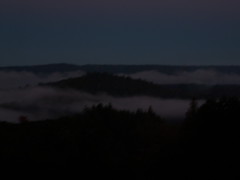
Before dawn
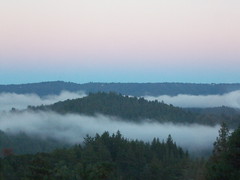
The sky lightens

First light
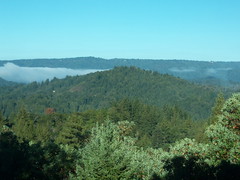
Morning

Afternoon
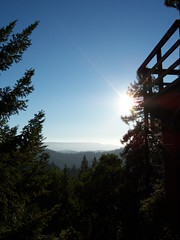
View from the front door
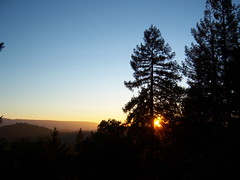
Last light

Sunset
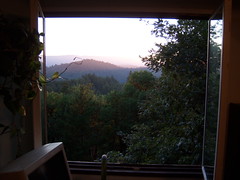
Window
Composed by
Scott
at
11:32 AM
1 Dendrites
![]()

